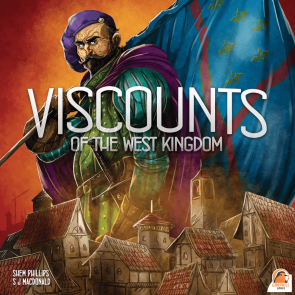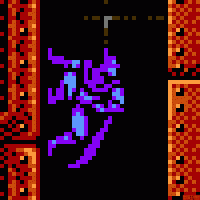Viscounts, the third and final installment in Garphill Games' West Kingdom trilogy is here, picking up the baton from Paladins, and running in a different direction. Rondels and deck-building in the same game? Be still my beating heart!
First we had Architects, which was a bit like a grown-up Stone Age worker placement game. A good game, but not too heavy. Then came Paladins, which really upped the ante and got a lot heavier, and did a really nice twist on the standard worker placement formula. Towards the end of 2020, Viscounts arrived, and was one of a growing trend of combining deck-building and other mechanics.
In Viscounts of the West Kingdom we're sending our viscounts around the kingdom, constructing buildings, transcribing manuscripts, and increasing our nobles' influence in the castle. To do that we're using our band of townsfolk and criminals, gaining deeds and converting debts, trying to prove ourselves the most powerful.
King Of The Castle
I have no shame in saying that one of my favourite things in this deep, strategic game, is moving all the little dudes around on the castle. It's ridiculously satisfying. Lots of games have actions that combo up and give you stuff, but none do it in such a fun, toy-like way. I take an inordinate amount of pleasure from moving the pieces around and telling everyone else - in explicit detail - what I'm doing.
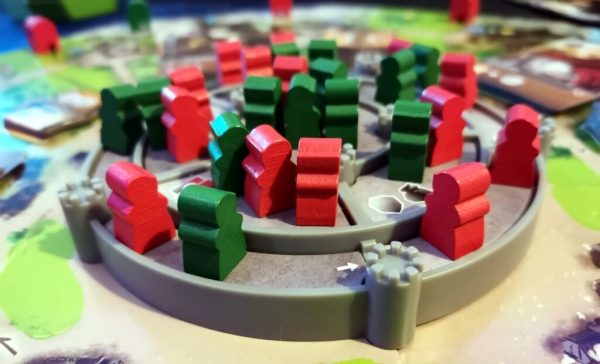 This castle is absolutely packed, players competing for the top spot
This castle is absolutely packed, players competing for the top spot
"So i add my guys here, then this one goes here, that one goes there, and this one goes up a level and gets me a free move on the first tier. I move him, there, and trigger another one. This guy goes up, flips a debt for me (thank you very much), now there's three in there, so up he goes again to the top, and now I take a resource, and the castle lead card. Oh, and look down here, there's four in this section now, and two of them are yours? Oh dear, off you get then. My castle! Adam's castle!"
Yeah, I can be pretty annoying to play games with.
That's just one part of the puzzle though. Getting the buildings off your board gives you some really powerful bonuses, like permanent bonus icons for your preferred action, and clearing a full set of buildings is worth loads of points. Collecting manuscripts is the real sleeper strategy though, the initial bonuses on them aren't always extravagant, but the bonuses for collecting sets of different coloured ones, and the bonus cards for being first to collect three of a kind, can lead to some crazy end-of-game scoring.
Getting The Full Picture
One thing I found in my first few plays, is that it's very easy to get drawn into this mindset of 'see what cards I have, see what I can do, do that, repeat'. Playing this way however, you're not really taking advantage of the gimmick (and I really don't like that term) of having deck-building. Choosing which cards to destroy when you can, and which you recruit into your deck, is one of those things which shows its importance more with each play.
There are usually small margins in victory in Viscounts, and a carefully crafted deck means you can do your preferred action maybe even just one more time than your opponent, and that can be the difference between winning and losing. Destroying cards not only refines your deck, but you also get the value of the card back in silver, which is also vital for certain things. You will undoubtedly reach a point in one of your games where the thing you need to complete your master plan is one... space... further... than you can move, and that single silver piece can be spent to increase your range by one.
That's the sort of margins we're talking about here.
Set Your Own Pace
It's no secret that I love heavy euro games. One thing that I've noticed in a lot of the games I played last year is that you can always see the end of the game. In Merv you get twelve turns. In Praga Caput Regni it's something like 16. Even in Shem's own Paladins of the West Kingdom, there are eight rounds, then it's done. Don't get me wrong, I don't mind that at all, all of those games are fantastic. What it leads to though is a lot of over-analysis for the last turn, trying to squeeze the maximum points from it.
In Viscounts, the end is driven by the deed and debt decks, and when one runs out. It's maybe a subtle difference, but an important one to me. It's something normally in older or more light- or middle-weight games, like Stone Age, Dominion, or even Ticket To Ride. Seeing it again in Viscounts made me really appreciate the tension and meta game it brings; keeping an eye on your opponents, the cards remaining, where the virtue and corruptions are, trying to figure out if it's worth triggering the end and watching people scramble for the last points.
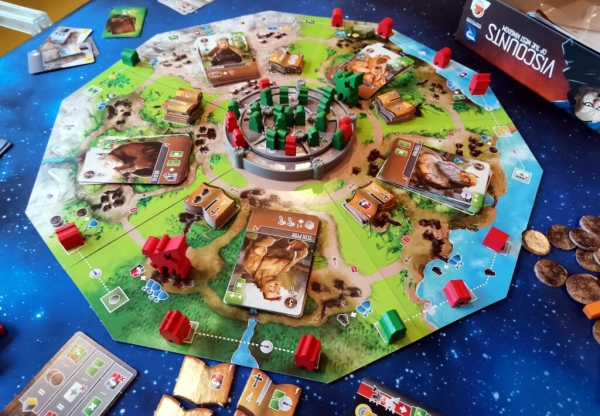 A game near the end. That board gets busy.
A game near the end. That board gets busy.
Any Pieces Missing?
The danger when combining mechanics in a game is whether all the pieces of the puzzle fit together. Nobody wants a jigsaw with a piece missing, or the wrong shaped holes and nobbles? tongues? Whatever the sticky-outy bits on a jigsaw piece are called. Anyway, I digress. Viscounts marries everything together really nicely.
There is so much randomness in setup that no two games will feel the same, and there are a lot of different ways to play, and no dominant strategy. You'll see people say that filling the castle is an easy road to win every time, but when you compare the points available for completing all the castle actions, buildings, and the maximum realistic amount of manuscripts, it really isn't.
The deck-building is really clever. Balancing who is in your deck, who you recruit or dismiss during you turn, the order you move them across your board, and combining the icons and effects on them, it's really nicely done. Much like moving and taking actions, the card management feels like a game in its own right, but the really important thing here is that although each part feels like a game, the way they combine is nigh-on perfect.
Deck-building, area control, resource management, player board upgrading - it's all there, and it all works.
"Dancing With Myself, Oh Oh, Dancing With Myself"
Even Billy Idol had to entertain himself sometimes, so it's a good job there's a full solo mode in the box. Shem puts proper opponents in his solo games, which I really like in a solo game, and Viscounts is another excellent example of how to do it well. Paladins' opponent was great, with variable difficulty, and Viscounts goes even further. The reverse side of each of the player mats has a different AI to play against, each focusing on a different favoured action. It's really well done, really easy on the housekeeping, and thanks to the clear iconography and excellent player aids is really easy to do.
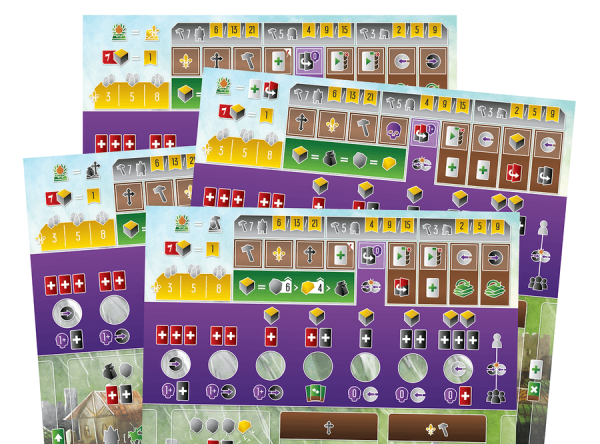 The various AI boards, their favoured actions in the top left corners.
The various AI boards, their favoured actions in the top left corners.
Solo doesn't feel like a "I'll have to make do with this instead of real people" option, it's really enjoyable experience deserving to be played even if you have a regular group around you.
The TL;DR Bit
In summary Viscounts is awesome. It plays smooth, it's great fun, it's on the heavy side. The deck-building works, the components are great, the solo is fantastic. You can play differently every time you play, which keeps things fresh. You'll know how to play it within your first game, and the teach is pretty painless too. If you like Garphill Games' other West Kingdom games, I think you'll love this. The Mico's distinctive art style might not be for everyone, but it's the signature on these games, and personally I love it.
But is it better than Paladins? ....hmmm, ask me this time next year.
 Games
Games How to resolve AdBlock issue?
How to resolve AdBlock issue? 















